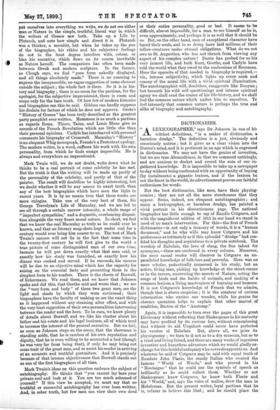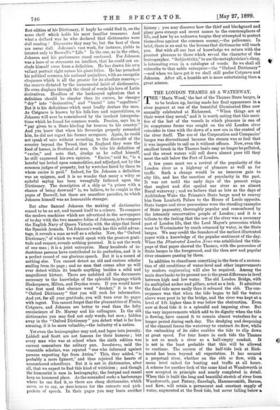DICTIONARIES.
"A LEXICOGRAPHER," says Dr. Johnson in one of his wittiest definitions, "is a maker of dictionaries, a harmless drudge." The definition is a jest, obviously and consciously untrue ; but it gives us a clear vision into the Doctor's mind, and it is pertinent in an age which is engrossed in dictionaries. We may not have the genius of invention, but we are true .Alexandrians, in that we comment untiringly, and are anxious to docket and record the sum of our -in- gathered knowledge. It is impossible to take up a newspaper to-day without being confronted with an opportunity of buying (by instalments) a gigantic lexicon, and if the lexicon be not the finest in the world, its advertisement proves our faithful enthusiasm for words.
But the best dictionaries, like men, have their physiog- nomies ; they are not all the mere storehouses that they appear. Some, indeed, are eloquent autobiographies ; and many a lexicographer, or harmless drudge, has painted a vivid portrait in his discontinuous page. The national biographer has little enough to say of Randle Cotgrave, and with the magnificent edition of 1611 in our hand we stand in need of no man's intervention. For this—the first of French dictionaries—is not only a treasury of words, it is a "human document," and he who wills may know Cotgrave and his preferences as intimately as if this splendid "drudge "had con- fided his thoughts and aspirations to a private notebook. The worship of Rabelais, the love of slang, the fine talent for synonyms,—these are confessed in every column. Moreover, the most casual reader will discover in Cotgrave an un- paralleled knowledge of folk-lore and proverbs. Here was no mere scholar, pedantically immersed in his study, but an active, living man, picking up knowledge at the street-corner or in the tavern, uncovering the secrets of Nature, noting the songs of birds and the habits of animals, and making of a common lexicon a living masterpiece of learning and humour. It is not Cotgrave's knowledge of French that we admire, though that is above suspicion ; it is the amateur of curious information who excites our wonder, while his genius for obscure quotation helps to explain that other marvel of erudition, Burton of the "Anatomy."
Again, it is impossible to turn over the pages of this great Dictionary without reflecting that Shakespeare in his maturity may have profited by its curious lore, without remembering that without its aid Urquhart could never have perfected his version of Rabelais. But, above all, we prize its physiognomy ; we turn to it not as to a dry museum, but as to a tried and living friend, and there are many works of ingenious invention and hazardous adventure which we would gladly ex- change for this faithful antiquarywho never disappoints us. And whatever be said of Cotgrave may be said with equal truth of Resolute John Florio, the sturdy Italian who created the famous "World of Words," and who proved in his " Montaigne " that he could use the symbols of speech as brilliantly as he could collect them. Whether or not Shakespeare knew Cotgrave, he knew both Florio and his "World," and, says the voice of malice, drew the man in Holofernes. But the present writer, loyal partisan that he is, refuses to believe this libel ; and he should place the first edition of his Dictionary, if haply he could End it, on the same shelf which holds his most familiar treasures. And what a dullard was he who declared that dictionaries were dull reading ! Discursive they may be, but the best of them are never dull. Johnson's vast work, for instance, yields in interest only to Boswell's "Life." In the one, as in the other, Johnson and his preferences stand confessed. For Johnson was a hero of so strenuous an intellect, that he could not ex- clude himself even from a definition. He has drawn his own valiant portrait right across his giant folios. He has preached his political sermons, his national prejudices, with an energetic eloquence which is all the greater for its absolute reserve,— the reserve dictated by the immemorial habit of dictionaries. He even displays through the cloud of words his love of Latin derivatives. Heedless of the hackneyed aphorism that a definition should be simpler than its excuse, he changes "dry" into "desiccative," and " burial " into "sepulture." But it is his definitions which most loudly declare the man. As Cotgrave is known by his folk-lore and superstitions, so Johnson will ever be remembered by the insolent interpreta- tions which he found for common words. Pension, says he, is "pay given to a State hireling for treason to his country." And you know that when his Sovereign properly rewarded him, he did not regret his former arrogance. Again, he could not speak of oats without recording, to the discredit of the country beyond the Tweed, that in England they were the food of horses, in Scotland of men. Or take his definition of "excise," and note that, drudge as he called himself, he still expressed his own opinion. "Excise," said he, "is a hateful tax levied upon commodities, and adjudged, not by the common judges of property, but by wretches hired by those to whom excise is paid." Indeed, for Dr. Johnson a definition was an epigram, and it is no wonder that many a witty or spiteful saying has been wrongfully fathered upon the Dictionary. The description of a ship as "a prison with a chance of being drowned" is, we believe, to be sought in the pages of Boswell, but there are countless parodies, to which Johnson himself was an honourable stranger.
But after Samuel Johnson the making of dictionaries ceased to be an art, and turned itself to a science. To compare the modern machines which are advertised in the newspapers of to-day with the two massive folios of Johnson, is to compare the English Navy of Queen Victoria with the ships that faced the Spanish Armada. Yet Johnson's work has this solid advan- tage, it reveals a man as well as a scholar. Now, the " Oxford Dictionary," of which we would speak with the greatest grati- tude and respect, reveals nothing personal. It is not the work of one man ; it is a joint enterprise. Many hundreds of in- dustrious persons have contributed to its perfection, and it is a perfect record of our glorious speech. But it is a record of nothing else. You cannot detect an old and curious scholar smiling from its page ; and no man that comes after us will ever detect within its boards anything besides a solid and magnificent history. There are unfolded all the documents necessary to the knowledge of the splendid language which Shakespeare, Milton, and Dryden wrote. If you would know who first used that obscure word "donkey," it is to the "Oxford Dictionary" that you will rush for information. And yet, for all your gratitude, you will turn over its pages with regret. You cannot forget that the pleasantries of Florio, Cotgrave, and Johnson are better to read than the lofty omniscience of Dr. Murray and his colleagues. In the old dictionaries you may find not only words, but men ; hidden away in the "Oxford Dictionary" you detect what is far less amusing, if it be more valuable,—the industry of a nation.
Yet even the lexicographer may nod, and lapse into jocosity. Liddell and Scott are not famous for their humour ; but every man who was at school when the sixth edition was current remembers the solitary pun. 2vxopeirm, said the venerable scholars, was reputed "one who informed against persons exporting figs from Attica." This, they added, "is probably a mere figment," and thus rejoiced the hearts of unnumbered schoolboys. But it is not in dictionaries, after all, that we expect to find this kind of witticism ; and though the humourist is rare in lexicography, the footpad and rascal keep an honoured place. As the scoundrel seeks a harboumge where he can find it, so there are slang dictionaries, which serve, so to say, as doss-houses for the outcasts and pick- pockets of speech. In their pages you may learn another history ; you may discover how the thief and blackguard and gipsy gave strange and secret names to the commonplaces of life, and how by an unknown tongue they attempted to protect themselves against the common enemy,—the policeman. In brief, there is no end to the lessons that dictionaries will teach you. But with all our lust of knowledge we return with the greatest pleasure to those which reveal the character of the lexicographer. "Subjectivity," to use the metaphysician's slang, is interesting even in a catalogue of words. So we shall all subscribe to that noble enterprise—the "Oxford Dictionary" —and when we have got it we shall still prefer Cotgrave and Johnson. After all, a humble art is more entertaining than a great science.







































 Previous page
Previous page